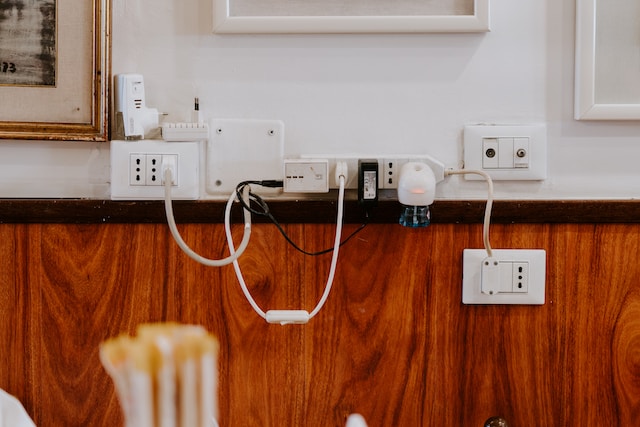Prior to packing any electrical appliances for Belize, it’s essential that you know its voltage and socket type specifications. Incompatibilities could lead to serious consequences and irreparable harm for both you and the device you bring along.
Plug adapters only modify the shape of plugs so they fit into Belizean power outlets; they do not alter voltage levels directly. In order to do that, a step up voltage transformer would be needed.
The Voltage of Belize: What You Need to Know
As a traveler, it is crucial that you familiarize yourself with the voltage and electrical socket type used in Belize so you can safely utilize your electrical devices while vacationing there. Doing so can prevent issues like blown fuses, broken appliances, or electrical fires which might arise as a result.
Belize operates with 110-volt electricity, similar to that used in the US. Most of their electricity comes from hydroelectricity and biomass energy generation sources which help lower greenhouse gas emissions while simultaneously improving environmental sustainability.
Belize Electricity Limited (BEL), a state-owned utility company, supplies electricity in Belize. BEL is currently investing in renewable energy projects to increase the supply of clean energy throughout Belize.
Although BEL provides electricity to most of the country, some remote areas may experience power outages at times. To prepare for these outages and ensure continuity of supply during an outage, it’s advisable to pack a portable battery charger or surge protector as an emergency backup power solution.
Make sure to pack a flashlight and extra batteries, just in case there’s no electricity or blackouts during your journey. Also bring along a small travel first aid kit filled with bandages, ointment and medical supplies should any accidents arise during travel.
Belizean power outlets typically take the form of either an A, B or G plug and outlet type. An A plug consists of two flat parallel pins while B plug has one grounding pin; G plugs have three rectangular pins in a triangular pattern arranged triangularly. If your device supports dual voltage output and its plug fits snugly into one of these power outlets then no adapters will be required; otherwise, you should bring along an adapter specific to Belize.
An adapter for Belize simply alters the shape of your plug so it fits into a Belizean power outlet, without changing voltage or current; therefore a power converter would be necessary if converting appliances to different voltage levels while in Belize. Going In Style’s Deluxe Adapter Kit contains two grounded adapter plugs so your grounded United States appliances can continue working while abroad.
A Guide to Electrical Adapters for Belize
Electrical adapters are an indispensable travel accessory, for various reasons. They ensure you can use your favorite devices abroad while protecting them from overheating or voltage fluctuations that could potentially damage equipment. Knowing which plug types and voltage standards are used in each country you plan on visiting is vital; an online directory can be very helpful here; simply search online and you’ll quickly be able to discover which plug types and sockets they utilize in any given nation.
As you research, keep in mind that Belize uses type A and B plugs. Also be prepared for power blackouts which occur frequently throughout the country as this could make charging your devices difficult – using an adapter could make this much simpler!
Travelers seeking the optimal solution should bring along a universal travel power adapter designed to work with various plug types and voltages worldwide, which will allow them to charge all their devices quickly, and even come equipped with a fuse protector in case any problems arise during use. Doing this may save money over time as opposed to purchasing separate adapters for each country they visit.
Based on the nature of your trip, it may also be wise to bring along a USB travel charger compatible with Belize’s voltage and socket types for easier charging of phones, cameras, or other gadgets throughout your stay. Note that many USB travel chargers will only adapt the shape of the plug rather than change current/voltage levels so they are best used with lower powered devices than high watt appliances like hair dryers/clothes irons.
You may need a non-grounded plug adapter for Belize if your appliance or transformer operates with dual/multi-voltage. A non-grounded plug has two flat blades without a grounding pin, making sure it’s compatible with local voltage, cycles and frequency specifications; most US electronics operate at 60Hz which may cause them not to function when connected to an outlet that operates at 50Hz in another country.
How to Avoid Electrical Shock in Belize
Those traveling to Belize soon should familiarize themselves with its voltage and socket types in order to prevent any unpleasant surprises during their visit and prevent injury or damage to electronics from taking place. Knowing these details will allow for a smoother journey and may prevent potential surprises that might otherwise arise during your journey.
Belize uses 110V and 60Hz electricity, meaning most US-made appliances should work just fine. But for your own safety and to use higher voltage devices like hair dryers and clothing irons without hassles. Bring along a power converter just in case! This way you won’t run into trouble unexpectedly.
As well as packing a plug adapter and voltage converter, a travel surge protector should also be packed. This device will protect your devices from high-voltage spikes that could occur from using regular wall outlets as well as ensure their proper charging while providing protection from fires or other damages that could occur from charging improperly.
Important to keep in mind is the fact that electricity in Belize isn’t as dependable as it is in the US; power outages may occur during storms or other natural disasters, making a battery-operated flashlight or smartphone with a flashlight app an invaluable asset in providing light when the electricity goes out.
While in Belize, always use GFCI outlets around any water sources like kitchens or bathrooms. These extra sensitive outlets are designed to prevent electrical shock by shutting off when they sense an overload of current. Furthermore, when renting homes be sure to only hire licensed electricians for any electrical work performed – doing this will not only lower your chance of an accident but will ensure your property meets all safety regulations and meets codes.
Staying Safe with Electrical Appliances
As a traveler, you may require various electrical appliances during your time abroad. These could include electronic devices, mobile phones and laptops. Knowing the voltage and electricity in Belize before leaving can ensure a much safer journey experience.
Belize Electricity Limited (BEL), is the primary power supplier for Belize. Hydroelectric plants provide most of their power supply, while renewable sources like biomass and wind also contribute. BEL serves as the sole provider of electricity throughout Belize.
If you plan on bringing any devices that aren’t dual voltage rated into Belize, make sure you bring an adapter and voltage converter as well. A good way to identify dual voltage devices is by checking their rating plate or manual; they should display something like “INPUT: 110-240V,” signifying they can handle both higher and lower voltages found there.
Plug adapters simply adapt your device’s plug to fit a Belizean outlet; they cannot change either its voltage or current. Therefore, if your dual voltage device requires 120V power but the electricity in Belize provides 220V instead, an additional voltage converter may be necessary.
To protect your appliances, it is advisable to pack a universal plug adapter. These types of adapters can accommodate many different countries and regions worldwide and can be purchased from major electronics stores or online retailers for much less money than purchasing multiple adapters and converters individually – and may even work in more than 100 different nations worldwide, saving both time and money in the process!




